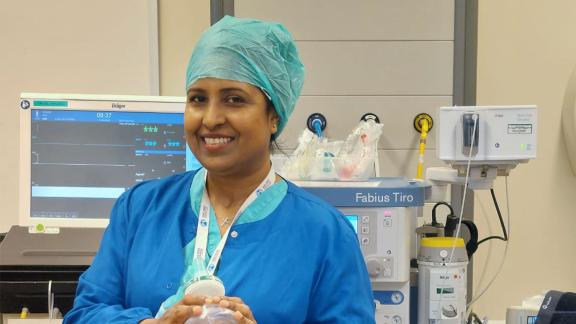My path to becoming a specialist doctor
15 October 2024
Authors
-

In 2010, my career in anaesthesia was defined in Sri Lanka where I completed my post- graduate qualification with specialist training in critical care.
In 2011, I came to the UK to gain experience in the NHS via the medical training initiative (MTI) as a trainee under the sponsorship of the Academy of Medical Royal Colleges. While gaining experience in the UK I read for the Fellowship Examination of the Royal College which is a highlight in my career.
Following this I took some time to go back and serve my country, where I worked as a consultant from many years and gained more experience. My life and career journey can be described as a sacred pilgrimage where I travel, stopping by to give and take as I go.
I have worked in both the public and private sector. It has taught me adaptability for service provision in different work cultures but while also maintaining your standards for what you believe is the best.
The pathway I took to become a specialist anaesthetist is slightly different from the usual pathway, progressing through years of being a specialty doctor. I was a consultant anaesthetist and graduated from overseas with many years of anaesthetic experience. I was looking for job opportunities in the NHS last year and I had the option of choosing to apply for a locum consultant post, but chose specialist anaesthetist job instead. This was more suited to my situation as it gives me more room and freedom to decide the path I choose, and I thought it provided greater stability with a permanent contract.
I found that when I was applying for jobs, the vacancies for specialist posts were scarce as the role was newly established.
I have navigated calm seas and rough seas on which I have survived to be wiser in the latter. I have learned the art of sailing in the vast seas of anaesthesia and it never ceases to surprise and teach me to be better. I have worked in both the public and private sector. It has taught me adaptability for service provision in different work cultures but while also maintaining your standards for what you believe is the best.
I have always thrived to improve quality where I work, my role has provided me more opportunities to engage with my interest areas. I have contributed to increasing awareness on improving ‘difficult airway skill training’ in the NHS trust that I currently work in. To support this, I’ve conducted a survey and I’m currently working on introducing tea trolley training in the department to improve patient airway safety. I am also interested in resuscitation teaching and training and have been selected to be a potential instructor in the Resuscitation Council UK Advanced Life Support (RCUK ALS) and plan to follow the path to be an Advanced Life Support (ALS) instructor in the future.
A specialist’s contribution is not only for fulfilling service needs but also teaching and training.
I think there is no shame in stopping and slowing down for a while to restructure, renew and rebuild yourself and your priorities in life. If I want to pursue the portfolio pathway for specialist registration in the UK, I can choose to do so in the future. Right now, being an effective and valued member of the anaesthetic team is more important to me. I am a happy mother of three boys aged 17, nine and five. I have always believed in a work/family balance and thrived to enjoy both and do justice to both worlds.
The Queen Elizbeth Hospital Kings Lynn where I work currently has four other specialist anaesthetists. Many of them taking lead roles and contributing to the department in their own special way. As opposed to a specialty doctor I see a specialist as a more senior anaesthetist who works independently in patient management and decision making in the areas of their expertise. They are well respected team members in the department where their opinions are considered on how to improve the standards of how we work. A specialist’s contribution is not only for fulfilling service needs but also teaching and training.
The higher pay for a specialist also reflects the standard required for this role. I see the specialist role as an opportunity, a light at the end of the tunnel for the specialty doctors who choose to rise above and beyond over the years. But these senior doctors need to be recognised and vacancies need to be created by employers to match the service needs.